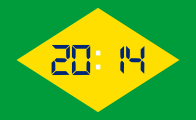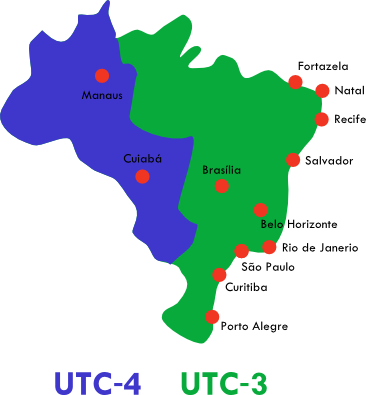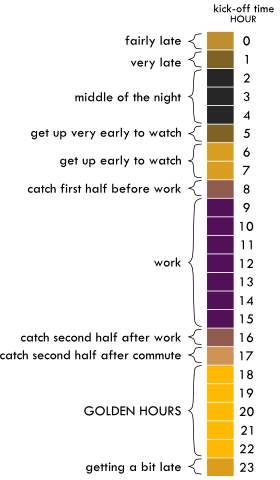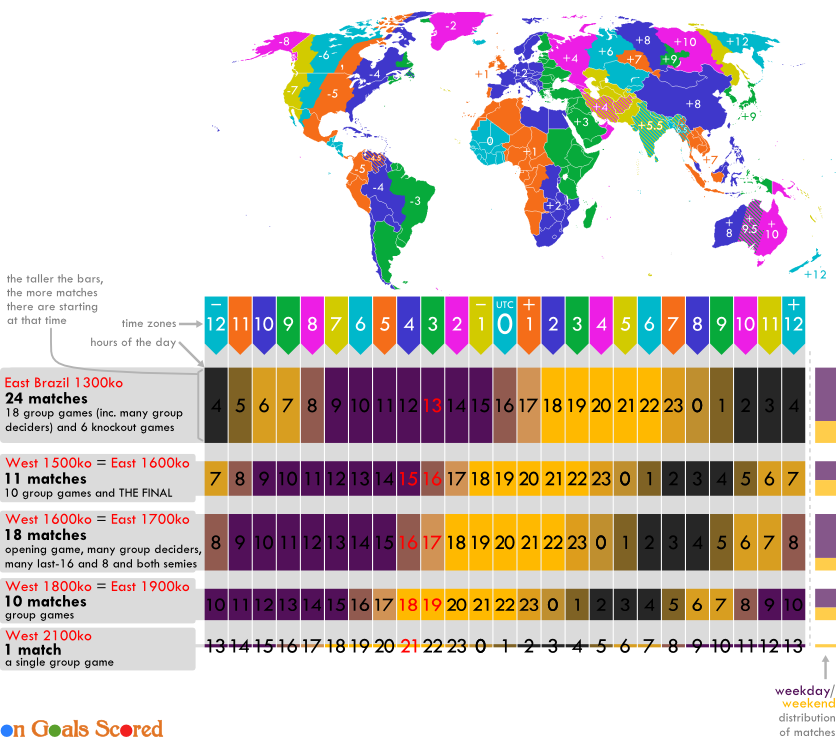Brazil 2014: kick-off times around the world

FIFA have announced the kick-off times for the 2014 World Cup in Brazil. At the time of posting, the tournament is nearly 20 months away and we only know one of the teams that will be taking part (the host) but it’s not too early to start planning how we can fit the 64 matches into our lives. This post aims to help you find out the kick-off times for your time zone and how convenient they are.

Brazil is split into two time zones. Of the host cities, Cuiabá and Manaus are in the west of the country and are 4 hours behind UTC (Coordinated Universal Time, which is equal to GMT). The other 10 host cities are in the east of Brazil, mostly on the Atlantic coast, and are 3 hours behind UTC. The matches kick-off at eight different times from a local point of view but some are equivalent (e.g. 1500 in west Brazil = 1600 in the east) so only five different times from the point of view of a fixed time zone.
Some Brazilian states adjust their clocks for daylight saving in summer and some do not but the World Cup is taking place in the Southern Hemisphere winter so the clocks in Brazil are as normal. Daylight savings in the Northern Hemisphere are taken into account e.g. the UK will be British Summer Time = GMT+1.

I use a colour scheme to mark the time of day in each of the world’s time zones at a given moment (it’s the same colouring I used in 2011 for the Copa America). It assumes a working day of 9am to 5pm. Working hours are coloured purple, sleeping hours are coloured dark grey, the best times for watching football are gold and the iffy border hours are shades between those.
This won’t apply as well to you if your schedule is vastly different to 9 to 5. On the right of the graphic below you can see the proportion of matches that are on weekdays and weekends to find out how much you should worry about the purple areas. Again this makes an assumption: that you work Monday to Friday.
Here’s how you use the graphic to find out what time of the day in your time zone the matches of Brazil 2014 will be taking place:
1. Find your time zone by matching the map to the numbers beneath it given in negative and positive hours from UTC i.e. -12 to +12 (the map uses a separate set of colours with no meaning other than to split the world up into time zones).
2. Follow your time zone straight down to see the hours that matches will start from your point of view for the different kick-off times in Brazil – these are hours of the day in 24 hour format i.e. 0 to 23.
3. Use the colours of these kick-off times to see at a glance how convenient the times are.
An example
Someone who lives in China learns from the map that they are in the UTC+8 zone so they read down from the 8 in the blue box roughly beneath China. The first number below their 8 at the bottom of the map is a 0 telling them that the 24 matches kicking off in the east of Brazil at 1300 start at midnight in China. Tracking straight down from this we pass 3, 4, 6 and 9 telling them the other matches will start at 3am, 4am, 6am and 9am from their point of view. Most of those numbers are in grey or greyish boxes which lets them see immediately that the World Cup will be in the dead of night or early morning with the best matches being the 10 that kick-off at 6am that can be fitted in before work.
Some analysis
The first thing that jumps out is the 24 matches that start at 1300 local time and are not confined to weekends – five sevenths are on weekdays. This means that games will conflict with work for many in Brazil but it works out very nicely for TV revenue as these games will be in the early evening in Europe. By no accident, Western Europe fairs very well indeed with the majority of matches being in the golden hours. Those, like me, in UTC+1 only have to worry about getting out of work in time so as not to miss the start of those 24 early matches and staying up to watch the solitary match that starts at 2am (and that’s on a Saturday). Other than that, everything is pretty handy for my time zone and the others that cover Europe. Africa also benefits from the pro-Europe scheduling, sitting as it does in the same time zones.
Kick-offs would have to be rescheduled at very inconvenient local times to offer any kind of compromise to satisfy the huge populations of the eastern parts of Asia which get a pretty rough deal with matches taking place primarily in the wee hours. Australasia will suffer similar inconvenience.
For the Americas, the worry will be football clashing with work rather than sleep. Efficiently, much of the rest of the purple area is taken up by the sparsely populated Pacific.


Incredible stuff, and so useful. Thank you, sir.
Dear person-who-made-this.
Never, never, never, never, NEVER… attempt to make an info-graphic again, you’re fucking shit at it.
Hi JimBobBQ,
I’m getting the impression you haven’t enjoyed this post. Although I appreciate the constructive feedback, I’m going to decline your suggestion and continue to attempt to make infographics. Who knows, maybe with practice I’ll be able to reach a level above fucking shit; fairly crap, perhaps.
Best wishes,
Liam
The descent into Partridgehood is something we all have to come to terms with as we age. You can try to resist but it claims everyone in the end. Let me know when it gets you so we can meet up to discuss Lexi.
JimBob (your name says it all), try not to talk so much shit next time you decide to comment on an interweb post. This post was not ‘fucking shit’, in fact it was fucking excellent and informative.
Thanks Liam, another interesting and usueful graphic
But please… the plural of semi is semis, surely! “Semies” hurts my eyes!
Thanks for this Liam
Very simple easy to follow info-graphic. Thanks for making things so clear.
On tip: Using more colours would allow you to distinguish between type of working hours (e.g. ‘catch the first half on lunch break’ or ‘sneak the first 15 minutes of the second half on your phone in the toilets’) and type of golden hours (e.g. ‘tea time – put a 45 minute meal in the oven pre-kick off to retrieve at half time to enjoy for whilst watching the second half’ or ‘wife comes home, may only catch bits during the Corrie break’) as well as highlight separate countries on the map so readers can enjoy a sense of patriotism. This might make things slightly simpler.
Just a thought.
[…] Tot slot nog een leuke visualisatie voor alle voetballiefhebbers die volgend jaar het wereldkampioenschap in Brazilië willen volgen: https://ongoalsscored.com/2012/10/13/brazil-2014-kick-off-times-around-the-world/ […]
so you didnt care about Africa in your explanation?
What about the bit where I mention Africa?
What is your opinion on the new “cooling break” introduced by FIFA during this World Cup?
In my opinion this is all because of pure ‘commercialization of the game’. I would say why was all of this needed in the first place? Why not to have games scheduled in the evenings with flood lights, no half shade issues, no temperature issues? Play…